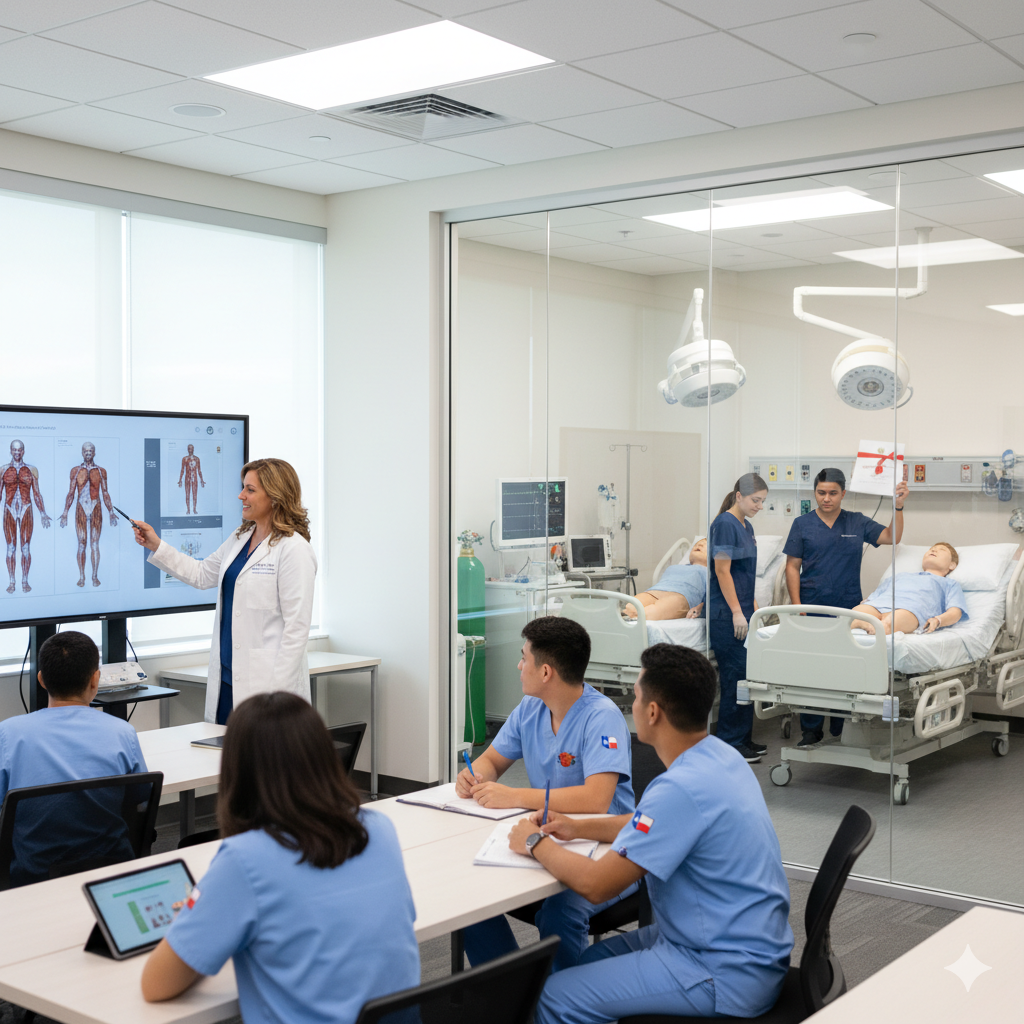Are you preparing to take the NCLEX exam and searching for a reliable NCLEX course in Texas, US? Whether you’re aiming to become a Registered Nurse (RN) or a Licensed Practical/Vocational Nurse (LPN/LVN), the right prep course can make a significant difference in your success. The NCLEX is a rigorous and essential step in your nursing career, and having a solid study plan, access to quality materials, and expert guidance are key to passing the exam on your first attempt.
In this comprehensive guide, we’ll walk you through what to expect from an NCLEX prep course, how to choose the best one for your needs, and how to make the most of your time preparing. Whether you’re looking for NCLEX prep courses near me, online options, or specialized NCLEX PN classes, this guide has got you covered.
What Is the NCLEX?
The National Council Licensure Examination (NCLEX) is the standardized test that determines whether you’re ready to practice safely as an entry-level nurse in the United States and Canada. There are two types of NCLEX exams:
- NCLEX-RN for Registered Nurses
- NCLEX-PN for Practical/Vocational Nurses
As of 2023, the NCLEX Next Generation (NGN) format was introduced, adding new item types designed to test clinical judgment and decision-making skills.
Why Take an NCLEX Course in Texas, US?
Texas is one of the largest states with a high demand for qualified nurses. With countless nursing schools and healthcare facilities, there’s also a wide variety of NCLEX review courses available. Taking a local NCLEX course in Texas offers several advantages:
- Local resources and networking opportunities
- In-person classes tailored to Texas BON (Board of Nursing) requirements
- Experienced instructors familiar with state-specific exam trends
Features of a High-Quality NCLEX Prep Course
If you’re searching for an NCLEX prep course near me, it’s crucial to evaluate your options based on the following features:
1. Comprehensive Content Review
A reliable NCLEX review course should include thorough content review of all key areas:
- Pharmacology
- Medical-surgical nursing
- Pediatrics
- Maternal and newborn care
- Psychiatric nursing
- Health promotion and maintenance
2. NCLEX Study Plan Customization
A structured and personalized NCLEX study plan is essential. Look for courses that allow you to:
- Assess your current level through diagnostic tests
- Set a realistic timeline (usually 4–12 weeks)
- Allocate time for content review, NCLEX practice tests, and revisions
3. Practice with NCLEX Next Generation Questions
With the recent shift to NCLEX Next Generation, it’s crucial that your course includes NCLEX Next Generation practice questions. These simulate the actual exam environment and assess your clinical judgment through:
- Case studies
- Extended multiple response questions
- Matrix/grid questions
- Drop-down options
4. Access to NCLEX Practice Tests
High-quality NCLEX prep courses include several full-length, timed NCLEX practice tests. These help you:
- Get comfortable with the format
- Build endurance
- Identify weak areas
5. Expert Instructors and Support
Choose a course with experienced nurse educators who can break down complex topics, answer questions, and provide encouragement. Some courses also offer one-on-one tutoring sessions or group study sessions.
Top NCLEX Course Formats in Texas
When searching for an NCLEX course in Texas, you’ll find multiple formats to suit different learning styles and schedules:
1. In-Person NCLEX Classes Near Me
Ideal for learners who thrive in a classroom setting, in-person NCLEX classes near me offer:
- Real-time interaction with instructors
- Group discussions and peer support
- Access to physical materials and labs
Many institutions in cities like Houston, Dallas, Austin, and San Antonio offer weekly or weekend sessions.
2. Online NCLEX Prep Courses
For flexibility, online courses are a great option. They often provide:
- Video lectures
- Interactive modules
- Downloadable resources
- 24/7 access to materials
Some online options are self-paced, while others follow a set schedule.
3. Hybrid Courses
Some providers offer hybrid courses that combine in-person instruction with online components, giving you the best of both worlds.
How to Choose the Right NCLEX Course in Texas
1. Check Reviews and Pass Rates
Look for testimonials and verified pass rates. A good NCLEX prep course in Texas should boast a high first-time pass rate (ideally 90% or more).
2. Compare Pricing and Value
NCLEX courses can range from $300 to over $2000. Consider:
- Length of access to course materials
- Number of practice tests included
- Availability of live support or tutoring
3. Accreditation and Reputation
Choose courses affiliated with reputable organizations or schools. Some prep providers even offer money-back guarantees if you don’t pass.
4. Trial or Demo Access
Many online providers offer a free trial or preview. Use this to check if the teaching style and content meet your needs.
Recommended NCLEX Prep Providers in Texas
Here are a few popular NCLEX courses in Texas that consistently receive positive reviews:
- Hurst Review Services – Known for clear explanations and a solid content review. Available in both live and online formats.
- Kaplan NCLEX Prep – Offers personalized study plans, practice questions, and a unique decision tree strategy.
- UWorld NCLEX – Focused on high-level practice questions with detailed rationales. Ideal for mastering the NCLEX Next Generation format.
- ATI Nursing Education – Common in nursing schools and includes comprehensive assessments and remediation.
How to Build Your NCLEX Study Plan
Here’s a sample 6-week NCLEX study plan to guide your preparation:
Week 1–2:
- Take a diagnostic test
- Focus on weak areas (e.g., pharmacology, med-surg)
- Study 3–4 hours per day
Week 3–4:
- Begin taking full-length NCLEX practice tests
- Review Next Generation practice questions
- Focus on test-taking strategies
Week 5:
- Revise key topics
- Take another full-length exam
- Analyze performance and address remaining gaps
Week 6:
- Light review and relaxation
- Final NCLEX practice test
- Get proper sleep and hydration before test day
Final Tips for NCLEX Success
- Don’t Cram: Follow a structured study plan and review regularly.
- Use Visual Aids: Diagrams, charts, and flashcards can enhance memory.
- Join Study Groups: Learning with peers helps with motivation and knowledge retention.
- Practice Daily: Aim for at least 50–75 practice questions per day.
- Understand the Rationales: Don’t just memorize answers—understand why they’re correct or incorrect.
Conclusion
Choosing the right NCLEX course in Texas, US can be a game-changer in your nursing journey. With tailored content, access to NCLEX Next Generation practice questions, and a solid study plan, you’re on the right path to becoming a licensed nurse. Whether you prefer in-person NCLEX classes near me or a flexible online course, there’s an option that fits your needs and schedule.
Invest in a course that supports your learning style, offers expert guidance, and builds your confidence. The NCLEX may be challenging, but with the right preparation, you’ll be ready to pass it with flying colors.
Frequently Asked Questions
It depends on your learning style. In-person classes provide direct interaction, while online courses offer flexibility. Choose based on your schedule and preferences.
Most candidates spend 6 to 12 weeks preparing, depending on their familiarity with the material and the study plan they follow.
Absolutely. A structured course can help you study efficiently, stay on track, and significantly improve your chances of passing.
Yes, many providers offer separate tracks and content tailored for both NCLEX-RN and NCLEX-PN candidates.




